See also
Overviews
![]() WikiProject—Wikiproject Politics
WikiProject—Wikiproject Politics
| Years in politics and government: | 2016 2017 2018 2019 2020 2021 2022 |
| Centuries: | 20th century · 21st century · 22nd century |
| Decades: | 1980s 1990s 2000s 2010s 2020s 2030s 2040s |
| Years: | 2016 2017 2018 2019 2020 2021 2022 |
Events pertaining to world affairs in 2019, national politics, public policy, government, world economics, and international business, that took place in various nations, regions, organizations, around the world in 2019.
Note: This section is provided for issue-based overviews in narrative format, if desired.
In December 2019, the World Meteorological Organization released its annual climate report revealing that climate impacts are worsening. [243] They found the global sea temperatures are rising as well as land temperatures worldwide. 2019 is the last year in a decade that is the warmest on record. [244]
Global carbon emissions hit a record high in 2019, even though the rate of increase slowed somewhat, according to a report from Global Carbon Project. [245]
In the first half of 2019, global debt levels reached a record high of $250 trillion, led by the US and China. [246] The IMF warned about corporate debt. [246] The European Central Bank raised concerns as well. [247]
Concerns increased about the European Debt Crisis as both Greece and Italy continued to have high levels of public debt. This caused concerned about stability of the Euro. In December 2019, the EU announced that banking ministers from EU member nations had failed to reach agreement over proposed banking reforms and systemic change. [248] [249] The EU was concerned about high rates of debt in France, Italy and Spain. [250] Italy objected to proposed new debt bailout rules that were proposed to be added to the European Stability Mechanism. [251]
In April 2019, Trump vetoed a bipartisan bill which would have ended US support for the Saudi-led military intervention. [252] With 53 votes instead of the 67 needed, the United States Senate failed to override the veto. [253] The legal arguments and policies of the Obama administration were cited as justification for the veto. [254] The US Deputy Assistant Secretary of Defense Michael Mulroy stated that US support was limited to side-by-side coaching to mitigate civilian casualties and if the measure had passed it would do nothing to help the people of Yemen and may only increase civilian deaths. [255] Mulroy supported the United Nation's peace talks and he pushed the international community to come together and chart a comprehensive way ahead for Yemen. [256] [257] [258] Writing in The Nation , Mohamad Bazzi argued that Mulroy's defence of US support as necessary to limit civilian casualties was false, and that "Saudi leaders and their allies have ignored American entreaties to minimize civilian casualties since the war’s early days". [259]
A trade dispute between the US and China caused economic concerns worldwide. In December 2019, various US officials said a trade deal was likely before a proposed round of new tariffs took effect on December 15, 2019. [260] US tariffs had a negative effect on China's economy, which slowed to growth of 6%. [260]
The United States–Mexico–Canada Agreement [261] is a signed but not ratified free trade agreement between Canada, Mexico, and the United States. The Agreement is the result of a 2017–2018 renegotiation of the North American Free Trade Agreement (NAFTA) by its member states. [262] Negotiations "focused largely on auto exports, steel and aluminum tariffs, and the dairy, egg, and poultry markets." One provision "prevents any party from passing laws that restrict the cross-border flow of data". [263] Compared to NAFTA, USMCA increases environmental and labour regulations, and incentivizes more domestic production of cars and trucks. [264] The agreement also provides updated intellectual property protections, gives the United States more access to Canada's dairy market, imposes a quota for Canadian and Mexican automotive production, and increases the duty free limit for Canadians who buy U.S. goods online from $20 to $150. [265]
![]() WikiProject—Wikiproject Politics
WikiProject—Wikiproject Politics
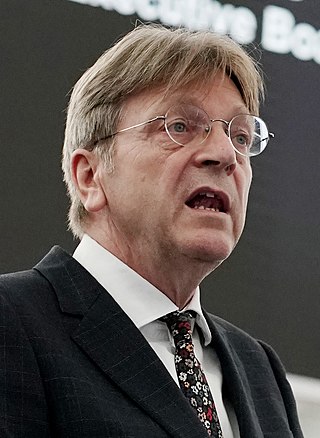
Guy Maurice Marie Louise Verhofstadt is a Belgian politician who was the leader of the Alliance of Liberals and Democrats for Europe from 2009 to 2019, and has been a member of the European Parliament (MEP) from Belgium since 2009. He was the prime minister of Belgium from 1999 to 2008 and deputy prime minister and minister of Budget from 1985 to 1992. He was a member of the Chamber of Representatives from 1985 to 2009.

Theresa Mary May, Lady May is a British politician who served as Prime Minister of the United Kingdom and Leader of the Conservative Party from 2016 to 2019. She previously served in David Cameron's cabinet as Home Secretary from 2010 to 2016, and has been Member of Parliament (MP) for Maidenhead in Berkshire since 1997. May is the UK's second female prime minister after Margaret Thatcher, and is the first woman to hold two of the Great Offices of State, the second being Liz Truss. Ideologically, May identifies herself as a one-nation conservative.
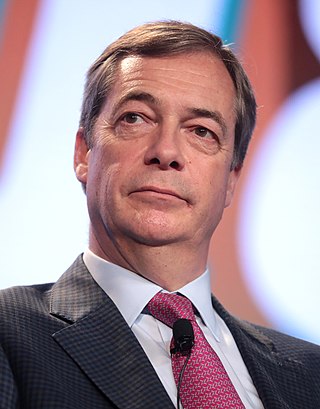
Nigel Paul Farage is a British broadcaster and former politician who was Leader of the UK Independence Party (UKIP) from 2006 to 2009 and 2010 to 2016 and Leader of the Brexit Party from 2019 to 2021. He was Member of the European Parliament (MEP) for South East England from 1999 until the United Kingdom's exit from the EU in 2020. He was the host of The Nigel Farage Show, a radio phone-in on the Global-owned talk radio station LBC, from 2017 to 2020. Farage is currently the Honorary President of Reform UK and a presenter for GB News.
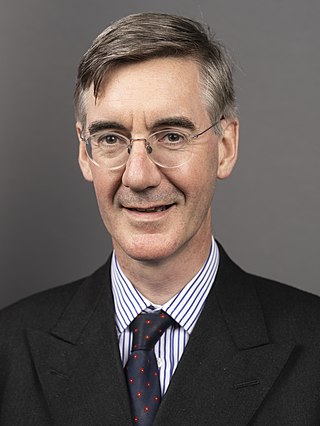
Jacob William Rees-Mogg is a British politician serving as the Member of Parliament (MP) for North East Somerset since 2010. Now a backbencher, he served as Leader of the House of Commons and Lord President of the Council from 2019 to 2022, Minister of State for Brexit Opportunities and Government Efficiency from February to September 2022 and Secretary of State for Business, Energy and Industrial Strategy from September to October 2022. A member of the Conservative Party, Rees-Mogg previously chaired the eurosceptic European Research Group (ERG) from 2018 to 2019 and has been associated with socially conservative views.

Alexander Boris de Pfeffel Johnson is a British politician, writer and journalist who served as Prime Minister of the United Kingdom and Leader of the Conservative Party from 2019 to 2022. He previously served as Foreign Secretary from 2016 to 2018 and as Mayor of London from 2008 to 2016. Johnson has been Member of Parliament (MP) for Uxbridge and South Ruislip since 2015, having previously been MP for Henley from 2001 to 2008.
Neo-nationalism, or new nationalism, is an ideology and political movement built on the basic characteristics of classical nationalism. It developed to its final form by applying elements with reactionary character generated as a reaction to the political, economic and socio-cultural changes that came with globalization during the second wave of globalization in the 1980s.

Brexit was the withdrawal of the United Kingdom (UK) from the European Union (EU) at 23:00 GMT on 31 January 2020. The UK is the only sovereign country to have left the EU or the EC. The UK had been a member state of the EU or its predecessor the European Communities (EC), sometimes of both at the same time, since 1 January 1973. Following Brexit, EU law and the Court of Justice of the European Union no longer have primacy over British laws, except in select areas in relation to Northern Ireland. The European Union (Withdrawal) Act 2018 retains relevant EU law as domestic law, which the UK can now amend or repeal. Under the terms of the Brexit withdrawal agreement, Northern Ireland continues to participate in the European Single Market in relation to goods, and to be a de facto member of the EU Customs Union.

General elections were held in the Democratic Republic of the Congo on 30 December 2018, to determine a successor to President Joseph Kabila, as well as for the 500 seats of the National Assembly and the 715 elected seats of the 26 provincial assemblies. Félix Tshisekedi (UDPS) won with 38.6% of the vote, defeating another opposition candidate, Martin Fayulu, and Emmanuel Ramazani Shadary, backed by the ruling party PPRD. Fayulu alleged that the vote was rigged against him in a deal made by Tshisekedi and outgoing President Kabila, challenging the result in the DRC's Constitutional Court. Different election observers, including those from the country's Roman Catholic Church, also cast doubt on the official result. Nonetheless on 20 January the Court rejected his appeal and declared Tshisekedi as the winner. Parties supporting President Kabila won the majority of seats in the National Assembly. Félix Tshisekedi was sworn in as the 5th President of the Democratic Republic of the Congo on 24 January 2019, making it the first peaceful transition of power in the country since it became independent from Belgium in 1960.

Theresa May's term as the prime minister of the United Kingdom began on 13 July 2016, when she accepted an invitation of Queen Elizabeth II to form a government, following the resignation of her predecessor David Cameron in the aftermath of the European Union (EU) membership referendum, and ended with her resignation on 24 July 2019. While serving as prime minister, May also served as the first lord of the treasury, minister for the civil service and leader of the Conservative Party. May's premiership was dominated by Brexit, in particular by her negotiations with the European Union of a Brexit withdrawal agreement, and her attempts to gain Parliamentary approval for this agreement, thereby achieving the departure of the UK from the EU. Other events during May's premiership included terrorist attacks in Westminster, Manchester Arena and London Bridge, the Grenfell Tower fire, the Windrush scandal, and the poisoning of Sergei and Yulia Skripal. The UK's official assessment of this incident was supported by 28 other countries, who expelled an unprecedented total of 153 Russian diplomats. This was considered to be one of the highest points of May's premiership.
This is a summary of the electoral history of Boris Johnson, the Member of Parliament for Uxbridge and South Ruislip since 2015 and Prime Minister of the United Kingdom from 2019 to 2022. He also served as Mayor of London from 2008 to 2016 and Foreign Secretary from 2016 to 2018.
Events from the year 2019 in the United Kingdom. Lack of agreement on how to proceed with withdrawing from the EU led to substantial political turmoil during this year culminating in the 2019 General election in which the pro-Brexit Conservative party gained a significant majority of seats.
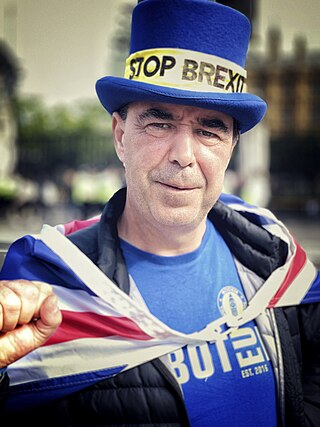
Steven Bray is a British activist from Port Talbot in South Wales who, in 2018 and 2019, made daily protests against Brexit in College Green, Westminster. He is variously known as Stop Brexit Man, Mr Stop Brexit or the Stop Brexit guy. He was often heard during TV broadcasts from College Green at Westminster shouting anti-Brexit statements or seen quietly walking into the background of live TV interviews, wearing a colourful blue outfit and carrying placards with a simple 'Stop Brexit' or anti-government message.

A referendum on the Brexit withdrawal agreement, also referred to as a "second referendum", a "rerun", a "people's vote", or a "confirmatory public vote", was proposed by a number of politicians and pressure groups as a way to break the deadlock during the 2017–19 Parliament surrounding the meaningful vote on the Brexit deal.
This is a timeline of major events concerning Brexit, starting from the referendum, running through Brexit day on 31 January 2020, and on to 1 January 2021.
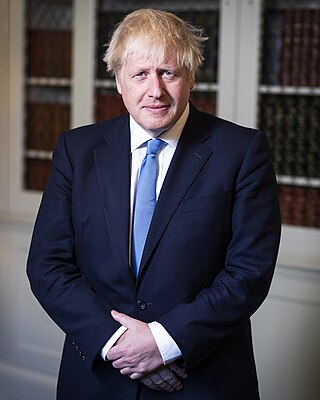
Boris Johnson's term as the prime minister of the United Kingdom began on 24 July 2019 when he accepted an invitation of Queen Elizabeth II to form a government, following the resignation of his predecessor Theresa May after Parliament's repeated rejections of her Brexit withdrawal agreement. While serving as prime minister, Johnson also served as the first lord of the treasury, minister for the civil service, minister for the union, and leader of the Conservative Party. His premiership ended with his resignation on 6 September 2022. Johnson's premiership was dominated by Brexit, the COVID-19 pandemic, the 2022 Russian invasion of Ukraine, and the cost of living crisis. His premiership was also characterised by several political controversies and scandals, most notably the Partygate scandal.

Boris Johnson has declared his position on many political issues through his public comments. Johnson's political positions have changed throughout his political career. His policies, views and voting record have been the subject of commentary during Johnson's tenure in various positions, including as Mayor of London from 2008 to 2016 and Prime Minister of the United Kingdom from 2019 to 2022.

The European Union (Withdrawal) Act 2019, commonly informally referred to as the Benn Act after the Labour MP Hilary Benn as Chair of the Exiting the European Union Select Committee who introduced it, was an act of the Parliament of the United Kingdom that required the Prime Minister of the UK to seek an extension to the Brexit withdrawal date—then scheduled for 31 October 2019—in certain circumstances. The main provisions of the Act were triggered if the House of Commons did not give its consent to either a withdrawal agreement or leaving without a deal by 19 October 2019. The Act proposed a new withdrawal date of 31 January 2020, which the Prime Minister was obliged to accept if the proposal was accepted by the European Council.
Events pertaining to world affairs in 2020, national politics, public policy, government, world economics, and international business, that took place in various nations, regions, organizations, around the world in 2020.
2010s political history refers to significant political and societal historical events in the United Kingdom in the 2010s, presented as a historical overview in narrative format.
France will preside over the G7 in 2019